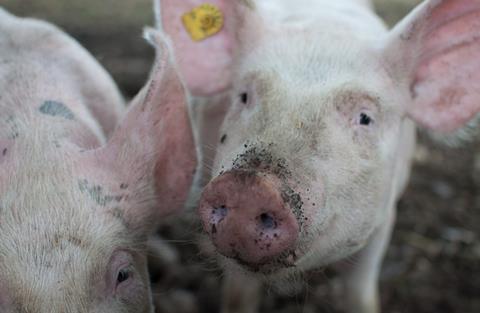The National Pig Association (NPA) has welcomed Defra’s support in addressing the ‘perfect storm’ of events that have left the pig sector in its most critical state for decades, but has warned there is still much to do to avert a crisis.

Defra Farming Minister, Victoria Prentis, chaired a roundtable event earlier this week, which was also attended by Secretary of State George Eustice and senior Defra officials. Representatives from the NPA, processors, retailers, AHDB and the devolved administrations also participated.
The roundtable was held at the request of NPA chairman, Richard Lister to discuss the series of events that has seen thousands of pigs build up on farms due mainly to a combination of Covid-19 problems in pork plants and export disruption since early January.
NPA chief executive, Zoe Davies, said: “This was a very constructive meeting, and we are very grateful for how seriously both Ministers and the department are taking this.
“They were fully aware of the issues and we were able to raise our concerns and discuss what could be done at departmental level, but also right across the supply chain in terms of sourcing more British pork to prevent what could turn into a very serious situation for the pig sector.
“Of course, we now need to turn these positive discussions into action, but we were very encouraged by what both Defra and retailers had to offer.”
Mr Lister, who farms pigs in Yorkshire and Nottinghamshire, began by outlining the “unique set of circumstances which have created the current perfect storm we face.”
He explained how Covid-19 problems in processing plants, coupled with a lack of China re-certification for several abattoirs and Brexit issues, have created a backlog in excess of 100,000 pigs on farm.
“The net effect of this has been that many more pigs need to be cared for and provided with increasingly expensive feed and straw, resulting in rapidly declining cashflows and mounting losses for producers. The backlog is growing and pig farming is at its most critical state for 20 years,” he told the meeting.
"We will only find real solutions if all parties - producers, processors, retailers, trade bodies and Government - are prepared to put self-interest aside and work together for the good of the great British pig industry.”
It is estimated that, on average, UK producers are losing around £20 on each pig they produce, according to the NPA.
“Whilst we have farm contingency plans in place to cope with short term difficulties in moving livestock, these plans cannot be sustainable in the face of continuing and further backlogs,” Lister added.
The processors, represented by British Meat Processors Association (BMPA) pigmeat committee chairman Andrew Saunders, outlined the issues they had faced related to Brexit and Covid-19, but stressed that regaining access to China was the single most effective way to resolve the current issues.
Davies agreed that China was important for some, but said that this would take time, which was something that we did not have. She reiterated that we needed to find alternative solutions and fast. Recognising the need, Defra Ministers encouraged processors to look for interim alternatives.
“Retailers present were also supportive and said that demand for British pork was currently strong, so if processors could provide the product, they would sell it,” Davies said.
“Whilst the biggest demand was for bacon, which is something that British pig farmers cannot produce enough of, one helpfully suggested that we ask AHDB to look at national carcase balance to see which cuts could benefit from further promotion.”
Lister added: “This is a really important first step – and we are really grateful for Defra’s on-going support.
“This is a complex issue to which we knew there would be no single solution or we would have resolved it by now.
“There is clearly plenty still to be addressed, but the key message we took from this constructive meeting is simple; we will only find real solutions if all parties - producers, processors, retailers, trade bodies and Government - are prepared to put self-interest aside and work together for the good of the great British pig industry.”
This story was originally published on a previous version of the Meat Management website and so there may be some missing images and formatting issues.












